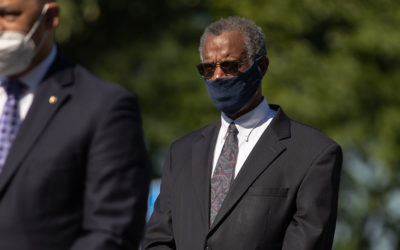Senate Democrats
Reform Policing in Pennsylvania
On June 24th, the Pennsylvania Senate unanimously passed two major pieces of police reform legislation, both sponsored by members of the Senate Democratic Caucus: Senate Democratic Leader Jay Costa, Jr. and Senator Sharif Street.
Senator Costa’s bill, Senate Bill 459, mandates that all police departments maintain records of use of force incidents that detail the event, including the reason for the use of force, detail of the injuries inflicted, as well as property damage or death.
Senator Street’s bill, Senate Bill 1205, bans the use of chokeholds in an officer’s efforts to detain an individual and would require every municipal police department to adopt a use of force policy, publish that policy for the public and train its officers to that standard.
Members of the Pennsylvania Senate Democratic Caucus introduced a comprehensive package of legislation to reform policing in Pennsylvania.
Two years ago, members of the caucus introduced police and community relations reform bills in the wake of Antwon Rose’s death, but those bills did not move. George Floyd’s murder, caught on tape, has awakened national attention and the problems are broader than his tragic case.
- 1,042 people have been shot and killed by police in the past year
- The rate of black Americans killed by police is more than twice as high as the rate for white Americans
- Since Michael Brown, another unarmed black man, was killed in 2014 in Ferguson, Missouri by police, a Washington Post investigation found that the FBI undercounts fatal police shootings by more than half
“We have to end racism that permeates our culture, and we have to reform our system of policing,” said Senate Democratic Leader Jay Costa, Jr. “I tried two years ago, and my legislation stalled. We cannot let that happen again. The Pennsylvania Senate Democrats have expanded our package of bills to include critical reforms and we must pass them this session.”
Statement from PA Senate Democrats on Racial Equity
Like many of you, we in the Pennsylvania Senate Democratic Caucus are struggling with the death of George Floyd and working to understand what equity is and how it is understood by different people. The events in Minneapolis unfortunately represent a pattern of violent incidents resulting from the fundamental misunderstanding of what equity means: from the lynching of Emmett Till to the beating of Rodney King to the shooting of Breonna Taylor, Tamir Rice and Trayvon Martin. All were victims of an unjust and unequal society that fails to see the humanity of every person regardless of their race or ethnicity.
As a nation, we will never be able to deliver equity or justice to a family or a community if we do not understand their lived experience. Feeling the same moral outrage after witnessing multiple similar events over the last few years, many of us joined you in the streets for peaceful protests and calls to action. Unfortunately, many of us have also witnessed these peaceful and Constitutional gatherings turn dark, as the messages of peace and unity were supplanted by people seeking to wreak havoc and sow discord. We have condemned the theft and vandalism while protecting our own homes and communities.
No one who believes in the equity of human beings can justify what happened to George Floyd, nor can they justify the disproportionate response with which many peaceful protests were met over the past several days. Nor can anyone who has examined the state of our union over the last several years disagree that racial inequity has been allowed to fester and grow throughout the country. From law enforcement to education to health care, institutions of government cannot be allowed to willfully close their eyes to the plight of others. We know racism, prejudice and bigotry have no place in public policy, and must act like it. This moment of tragedy has given us yet another opportunity to dismantle and replace mechanisms that perpetually lead to negative outcomes for so many. PA Senate Democrats continue to aggressively pursue legislative change to bring equity in the face of injustice. Our humanity will lift us out if this moment of profound pain, and we can move toward a future where everyone is treated with the dignity they deserve.
Sen. Anthony Williams Statement on Charges of Officers Involved in the Death of Fanta Bility
Philadelphia – January 18, 2022 – Sen. Anthony H. Williams (D- Philadelphia/Delaware) released the following statement following the announcement that the officers involved in the shooting death of Fanta Bility will be charged: “Today represents a moment of hope as we...
Senator Street Statement on the One Year Anniversary of George Floyd’s Murder
Philadelphia, PA − May 25, 2021 – On the one-year anniversary of George Floyd’s death Senator Street offered the following statement on the progress of police reform in the Pennsylvania General Assembly: “Today marks a full year since the murder of George Floyd. There...
Senator Haywood Highlights Harassment of Black Students at PASSHE Schools, Questions Chancellor in Senate Hearing
Harrisburg, Pa. − October 21, 2020 − Today in a hearing of the Senate Education Committee, Senator Art Haywood shared stories he had learned from Black students at the PA State System of Higher Education (PASSHE) universities and blasted PASSHE Chancellor Dan...
Kearney Introduces “Breonna’s Law” to Ban No-Knock Warrants
HARRISBURG (August 19, 2020) – Senator Tim Kearney (D – Delaware, Chester) today introduced "Breonna's Law" to ban no-knock warrants, which allow law enforcement to forcibly enter a person's home without warning. The bill is named after Breonna Taylor, a...
Delaware County lawmakers call for investigation into violence against Black Lives Matter supporters
HARRISBURG – August 7, 2020 – Today, a group of state lawmakers from Delaware County called for District Attorney Jack Stollsteimer to investigate violence and intimidation aimed at Black Lives Matter supporters during a march in Ridley Township on Saturday, August...
Senator Anthony H. Williams Hosts Racial Equity Solutions Tour Kickoff Event with Special Guest Van Jones
Harrisburg – July 22, 2020 – Sen. Anthony H. Williams (D- Philadelphia/Delaware) hosted a kickoff event for the Senate Democrat’s Racial Equity Solutions Tour. The event was held via Zoom for safety as we continue to battle the COVID-19 pandemic. Van Jones, Reform...
Racial Equity Solutions Tour Kickoff Event
Sen. Art Haywood Statement on Police Reform Bills Signed into Law
Philadelphia – July 16, 2020 – State Senator Art Haywood (D-Montgomery/Philadelphia) released the following statement on police reform bills signed into law: “We have finally seen one of the first victories in the fight for meaningful police reform in...
Gov. Wolf Signs Police Reform Bills
Legislation
Gov. Wolf Signs Police Reform Bills
Legislation Passed By Senate
SB 459 - Change the Standard for Police Using Deadly Force
Introduced by Senator Jay Costa
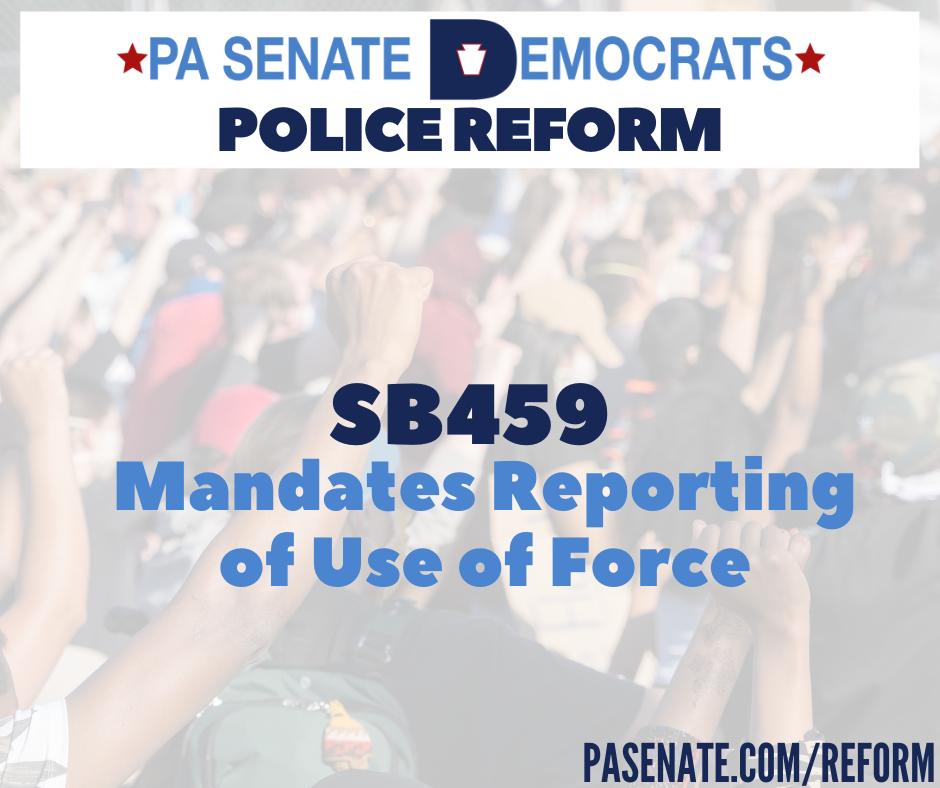
Current law allows for law enforcement to use deadly force if the officer believes that it is necessary to prevent death or serious injury, when a person is resisting arrest, when the person has committed a forcible felony, when a person is trying to escape and possesses a deadly weapon, or when a person is indicating they will harm another person. We believe this is far too broad. We propose to limit the circumstance for when deadly force can be used to events when there is an immediate threat of death or bodily injury to an officer or another person.
SB 1202 - Banning Chokeholds and Positional Asphyxia
Introduced by Senator Sharif Street

The deaths of George Floyd and Eric Garner, who both died at the hands of police using questionable methods of restraint, has made it clear that we need to ban chokeholds of any type. While chokeholds have been banned by many departments, this has not stopped their use. Additionally, many law enforcement and health personnel are taught to avoid restraining people in a way that can lead to positional asphyxia.
The Chief of Police Association accredits law enforcement agencies in Pennsylvania. In 2001, the Association introduced the Pennsylvania Law Enforcement Accreditation process for police departments to create standard policing practices amongst accredited agencies. These types of restraints are forbidden for accredited departments. However, according to the Pennsylvania Commission on Crime and Delinquency, only 118 of the more than 1,000 law enforcement agencies in the Commonwealth are accredited.
Our legislation would outlaw the use of the standard chokehold and define positional asphyxia as any action that inhibits breath or the flow of blood to the brain due to physical position.
Proposed Legislation
SB 458 - Training and Accountability
Introduced by Senator Jay Costa
Municipal Police Officer Education and Training Commission Improvements:
- Require new training elements for use of deadly force, community-oriented policing, de-escalation methods, interacting with diverse communities, and bias prevention. All of these are required to some degree now, but more needs to be done. Requiring each of these elements to be included in continuing education course work is also necessary.
- Creation of a database to require municipalities to report and track criminal, disciplinary, and investigation information for every municipal police officer for use by future hiring police departments.
- Improved psychological examinations of officers seeking MPOETC certification.
- Development of minimal guidelines for municipalities to adopt for forming and running police departments.
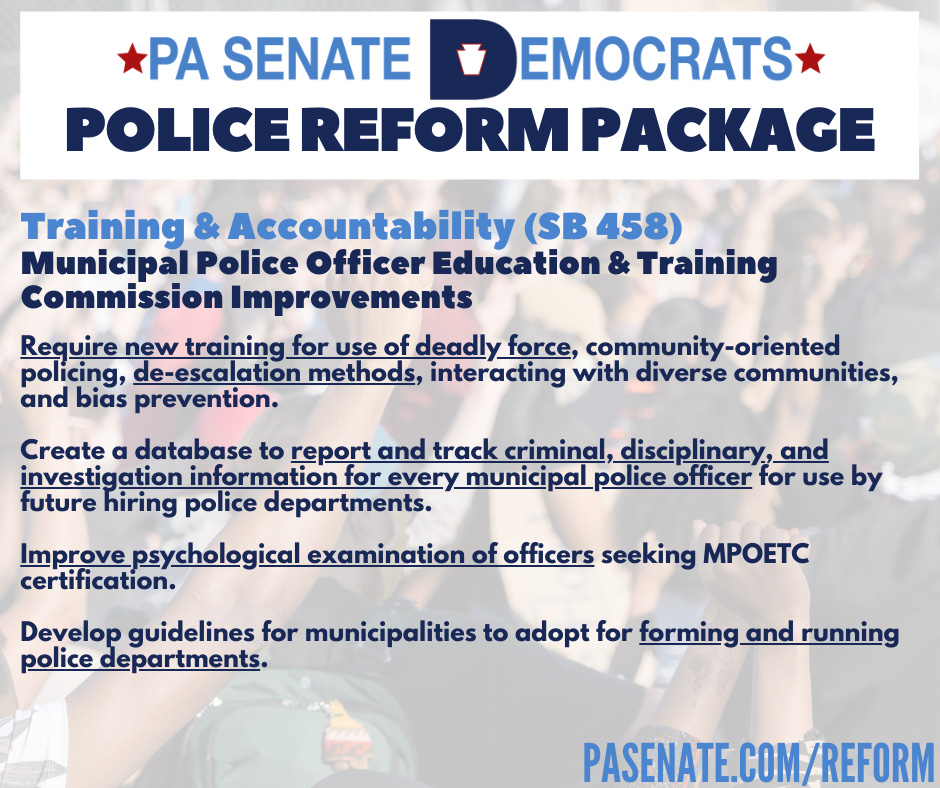
SB 611 - Special Prosecutor
Introduced by Senator Art Haywood
Our criminal justice system is meant to be impartial and for prosecutors to discharge their duties free of personal or professional conflicts. We have legislation that would take review and prosecution of deadly force incidents at the hand of police officers out of the jurisdiction of the local district attorney and put it in the hands of a special prosecutor.
Our bill would require the Attorney General to appoint a special prosecutor whenever there is a deadly force incident and a police officer is involved. The special prosecutor would serve as an impartial prosecutor and remove the perceived conflict a district attorney might have prosecuting a local police officer.
Our bill is not meant to punish an officer for discharging his or her duties. It is simply meant to provide a neutral review of a case when an individual dies at the hands of a police officer and to restore the shaken public trust in our judicial system. It is to be expected that prosecutors and police share a close relationship and have to work cohesively together. This relationship is typically productive and is important for fighting crime. However, in the eyes of many in the public, when an officer is involved in a potential crime this relationship may cloud the investigator.

SB 482 - Improved Police Pay
Introduced by Senator Jim Brewster
This legislation would improve opportunities and pay for part-time police officers. Officers are often under unimaginable stress, in part because they are stretched too thin on jobs that are very stressful themselves. We need to dedicate more resources to improve on-the-job conditions and decrease the chances that officers need to work multiple jobs.
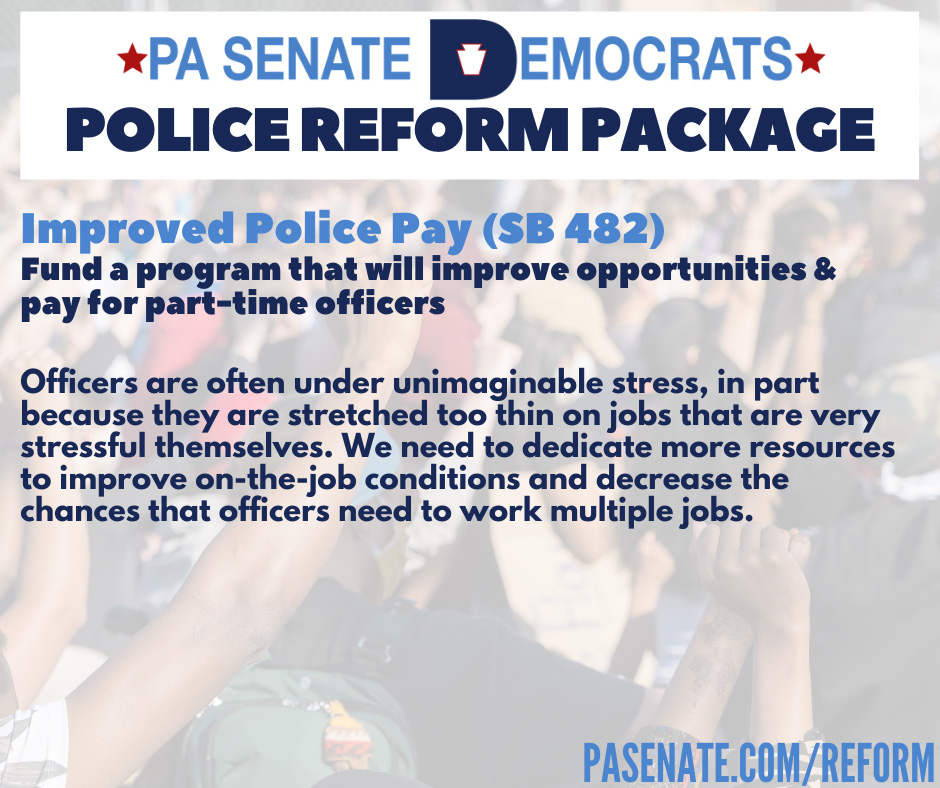
SB 472 - Regional Policing Incentive Program and Study
Introduced by Senator Jim Brewster
Related to the issue of low pay and police stress is the scale on which many police departments operate. Many communities are forced to operate with part-time officers, who themselves must work multiple jobs to make ends meet. One measure that can be taken to overcome this is to provide incentives for departments to merge or consolidate on a regional or countywide basis. The state should provide a grant incentive program to help with planning, facility decisions, equipment requirements, and operating costs associated with regionalization. This will provide a broader scale for hiring police at better wages, increase department access to minority communities for recruitment, and improve professionalization of officers.
In addition to the grant program, we will be introducing a resolution asking the Legislative Budget and Finance Committee to study cost savings from, funding sRacial Impact Statementsources for, and barriers to regionalization of law enforcement departments.

Racial Impact Statements
Introduced by Senators Vincent Hughes & Maria Collett
Too often, policymakers discuss and review legislation in a vacuum. We are charged with work that has serious and systemic impacts on minority communities. We should know how our criminal justice and sentencing policies can exacerbate the disparities already faced by people of color in our state.
A 2016 report from the Sentencing Project identified three recurrent explanations for racial disparities in state imprisonment: policies and practices; implicit bias and stereotypes; and structural disadvantages. It is our belief that racial impact statements would provide an effective mechanism for analyzing the true scope and unforeseen ramifications of our proposals.

Professional Oversight and Policy Development Board
Introduced by Senator Jay Costa
Many professions in Pennsylvania are overseen by professional licensure boards that are given authority to license, suspend, fine, revoke, and penalize licensed individuals. They are also charged with creating policies and guidelines for professional development and ensuring professionals in the field are credentialed and have achieved an appropriate standard of practice. We need to develop a similar board to make sure that the police are overseen on a day-to-day basis by a neutral third party, give the public a place to turn to file complaints, and the ensure that police have basic policies to follow and are required to seek ongoing training to retain their policing certification.
Many Pennsylvania municipalities and police department do not have satisfactory policies to guide police actions, including on use of deadly force and community interaction. Our legislation will require the board to provide municipalities and police departments with a requirement to implement best practices, including guidance on their development of the use of deadly force and community relations standards.

Improve the Standards for When Deadly Force Can Be Used by Law Enforcement
Introduced by Senator Art Haywood
The legislation would address the use of necessary force and provide for the following:
- Support de-escalation and non-lethal force tactics by creating a standard for reasonable force used by peace officers;
- Peace officers may only use deadly force when they believe it is reasonably necessary to defend theirs or another’s life from imminent death, serious bodily injury, kidnapping, or forced sexual intercourse.

8 Can’t Wait
Introduced by Senator Vincent Hughes
Proposal would create a more explicit and just standard for the use of force by police by following eight recommended policies. Included in this standard would be:
- Requiring the exhaustion of all reasonable alternatives before using force;
- Requiring the use of force be reported, including when force has been threatened but not used;
- Banning chokeholds and strangleholds;
- Establishing a use of force continuum that limits the type of force and weapons that can be used for specific types of resistance;
- Requiring the use of de-escalation measures prior to the use of force;
- Establishing a duty to intervene and stop excessive force by another officer, as well as immediately reporting incidents to a supervisor;
- Banning shooting at a moving vehicle; and,
- Requiring a warning be given prior to the use of fatal force.

Strengthening and Funding Municipal Civilian Police Oversight
Introduced by Senator Anthony H. Williams
Law enforcement exists to protect and serve the communities they police. Those communities should have a bigger voice in how that service is delivered.
Our legislation would strengthen police advisory commissions by granting them oversight of department policies, procedures and orders, as well as the authority to review all use-of-force or police misconduct incidents. State funding at a level of at least 1% of a local department’s budget would be provided to municipalities that enact strong civilian oversight measures to include the ability to terminate or otherwise discipline any officer for cause.

False Reports of "Criminal Activity" Based on Race or Ethnicity
Introduced by Senator Vincent Hughes
For the past week, people and communities across the Commonwealth have marched in protest of the killing of unarmed black and brown people throughout the nation. Unfortunately, more often than not, police are brought into these situations by someone reporting “criminal activity.”
Being black is not a crime. Being brown is not a crime.
Under this legislation, an individual who reports that “criminal activity” based solely on the race or ethnicity of an individual will be considered to be filing a false report under Title 18. An individual who files a false criminal report based solely on the race or ethnicity of an individual would be graded as first-degree misdemeanor.
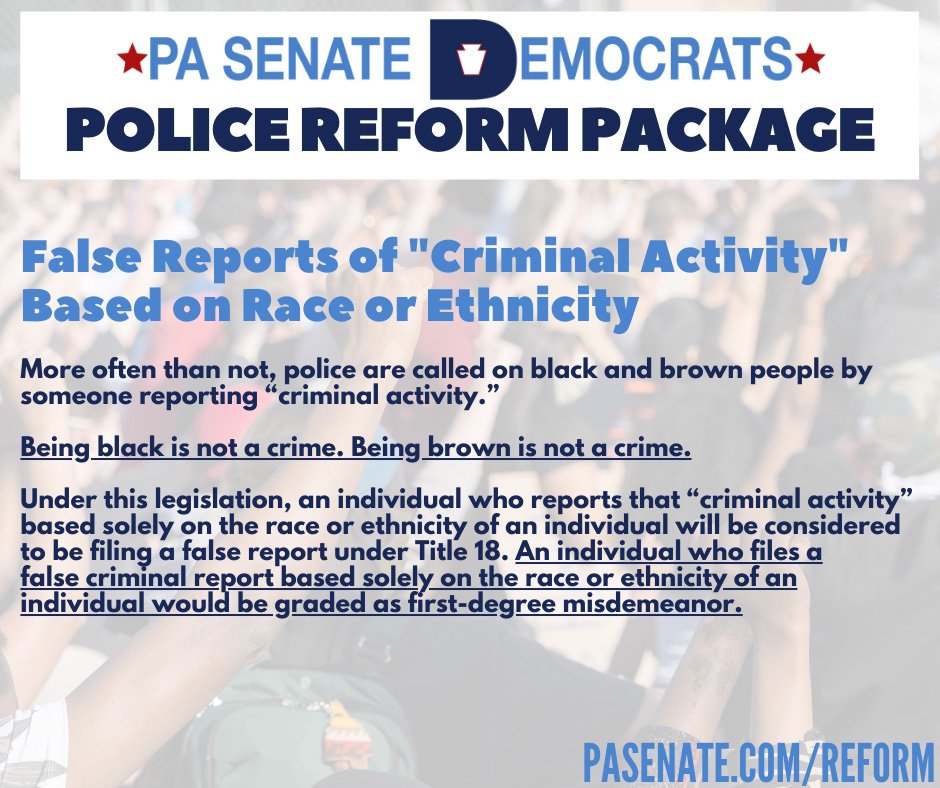
Demilitarize Law Enforcement
Introduced by Senators Sharif Street & Katie Muth
Law enforcement departments have been given nearly unfettered access to federal military equipment for the last three decades. Their use of this military equipment has driven a significant wedge between our communities and the departments sworn to protect them. This has had deadly impacts on people of color and impeded the exercise of Constitutional rights across the country.
We must prohibit access to certain military equipment while providing for local community input on other military equipment acquisitions. Our legislation would create a prohibited military equipment list and require local governing bodies to vote to approve any other purchases from military supply programs. It would also require this information to be made publicly available.

No Consent in Custody
Introduced by Senators Katie Muth, Maria Collett, Tim Kearney, Steve Santarsiero, and Lindsey Williams
In Pennsylvania, a police officer who sexually assaults a person in custody can use sexual consent by the individual as a defense in court. While state law bars consensual sex between corrections officers and prison inmates and between mental health workers and patients, no such protection exists for a person arrested or questioned by officers in the field. All taxpayers have a right to expect that law enforcement officers are carrying out justice efficiently and with integrity.
We have to close this dangerous legal loophole in Pennsylvania’s sexual assault law to better protect all women, men and children within our commonwealth.
Our legislation would expand Pennsylvania’s definition of institutional sexual assault to include law enforcement officers and any person in the officer’s custody. By doing so, it would eliminate sexual consent as a defense, making any sexual contact between an officer and a person in custody a third-degree felony.

Requiring Civilian Police Review Boards
Introduced by Senator Wayne Fontana
It has been widely argued that citizen participation in governmental policymaking produces many benefits, including greater trust in governmental operations. This legislation will require that every county in the commonwealth create a civilian police review board to provide oversight of local police departments. Just like the role a jury plays in a trial, an independent review board will allow the people to decide when unjustifiable actions have been made by the police rather than an internal investigation. This process will ensure greater transparency by granting an unbiased group of individuals the ability to determine if any criminal proceedings need to take place.

Enhancing Civil Asset Forfeiture Protections
Introduced by Senator Anthony H. Williams
Forfeiture of assets such as cash, automobiles and property currently occur as civil proceedings against the property in question, allowing assets to be seized from property owners regardless of whether they have been convicted of a crime for which forfeiture is a prescribed legal remedy. This has led to an increase in forfeiture cases nationwide as an alternative to criminal proceedings, where the burden of proof is much higher, and defendants are afforded due process rights. The resulting system allows property owners to be deprived of their due process, losing homes and other valuables without ever being charged for a crime.
Not only are innocent property owners entangled in this archaic legal process, there is also a perverse incentive for prosecutors and police departments to continue using civil forfeiture as an alternative to the criminal justice system. Under current law, cash and proceeds of sold property is required to be transferred to the county operating fund but then immediately released back to the District Attorney’s office. While this money may be spent on community drug prevention and anti-violence programs, it is most often used for police and prosecutor salaries and equipment.
This legislation would address the largest issues still surrounding civil forfeiture by requiring a connected criminal conviction of a property owner prior to forfeiture and returning the proceeds of forfeiture to the general fund of counties, or the state in cases where the Pennsylvania Attorney General prosecuted the case. These two reforms should put an end to abuses of the civil forfeiture statute and instead return the practice to its original intent: seizing the ill-gotten gains of convicted career criminals.

Racial Equity Solutions Tour
Racial Equity Tour Event with Senators John Blake and Anthony Williams
October 14, 2020 | 1 PM
Panelists Include:
- Ida Castro, Vice President of Community Engagement and Chief Diversity Officer, Geisinger Commonwealth School of Medicine
- Glynis Johns, Founder, Black Scranton Project
- Cathy Ann Hardaway, President, Greater Scranton MLK Commission
- Lia Richards-Palmiter, Director, Marywood University Office of Diversity
Racial Equity Tour Event with Senators Art Haywood and Anthony Williams
Racial Equity Tour Event with Senators Maria Collett and Anthony Williams
August 25, 2020 | 5 PM
Panelists Include:
- Reverend Charles W. Quann – Bethlehem Baptist Church
- Dr. Joy Bostic – Director of African and African American Studies, Case Western Reserve University
- DA Kevin Steele – Montgomery County District Attorney
- Professor John Hollway – Director of the Quattrone Center for the Fair Administration of Justice, University of Pennsylvania
- Shaykh Anwar Muhammad – President of Ambler Branch NAACP
Racial Equity Tour Event with Senators Maria Collett and Anthony Williams
July 20, 2020 | 11:00 AM
Participants
- Van Jones – CNN political contributor #cut50 co-founder, Reform Alliance CEO
- Jessica Jackson – #cut50 co-founder and Reform Alliance advocacy director
- Solomon Jones – WURD Radio Host and Advocate for Police Reform
- Kenny Duncan – Celebrity Barber and Advocate for Economic Freedom
- Jenna Moll – Justice Action Network action
Racial Equity Tour Event with Senators Tim Kearney and Anthony Williams
July 28, 2020 | 4:00 PM
Participants
- Keith Reeves, Swarthmore College
- Stefan Roots, journalist and activist
- Jonathan Feinberg, civil rights lawyer
- Hans Menos, Philadelphia Police Advisory Commission






